Black History, Religion
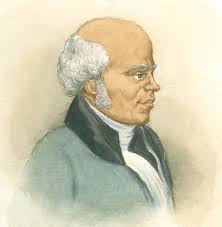 James Varick was born near Newburgh, New York, on January 10, 1750. His mother was a slave of the Varicks, or Van Varicks, and was later freed. His father, Richard, was born in Hackensack, New Jersey, where he was baptized in the Dutch Church. The family lived in New York City while James Varick was young, where he acquired an elementary education in New York schools. For many years, he worked as a shoemaker and later as a tobacco cutter to support himself and his family, because the church with which he was associated did not pay its preachers. About 1790, he married Aurelia Jones. The couple had four sons and three daughters. (more…)
James Varick was born near Newburgh, New York, on January 10, 1750. His mother was a slave of the Varicks, or Van Varicks, and was later freed. His father, Richard, was born in Hackensack, New Jersey, where he was baptized in the Dutch Church. The family lived in New York City while James Varick was young, where he acquired an elementary education in New York schools. For many years, he worked as a shoemaker and later as a tobacco cutter to support himself and his family, because the church with which he was associated did not pay its preachers. About 1790, he married Aurelia Jones. The couple had four sons and three daughters. (more…)
Black History, Religion
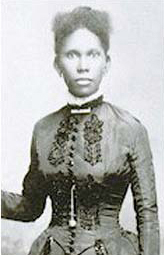
Mother Matelda Beasley
When Mathilde (later spelled Mathilda) Taylor was born on November 14, 1832 in New Orleans, to Caroline, a slave owned by James C. Taylor, few would have believed that she would later successfully defy the very laws that kept her and her mother from their freedom. It was speculated that her father was Native American and Mathilda inherited her “extreme height and her commanding figure� from him.
Little is known of Mathilda’s early years in Louisiana and there is no record of how she achieved her freedom to move to Savannah as a young woman. But by 1859, records indicate that she had been operating a secret school for African-American children at a time in history when “punishment for teaching slaves or free person of color to readâ€� was a “fine and whipping.â€� Facing great personal risks, she was committed to educating children who otherwise would have no opportunity for schooling and because there is little information about her school, she seems to have achieved her goal of keeping her efforts from the authorities. (more…)
Black History, Religion
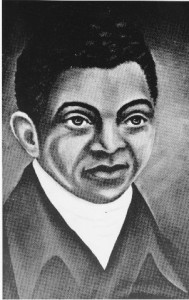 Harry Hosier (c.1750â – May 1806), better known during his life as “Black Harry”, was a black Methodist preacher during the Second Great Awakening in the early United States. Dr. Benjamin Rush said that, “making allowances for his illiteracy, he was the greatest orator in America”.
Harry Hosier (c.1750â – May 1806), better known during his life as “Black Harry”, was a black Methodist preacher during the Second Great Awakening in the early United States. Dr. Benjamin Rush said that, “making allowances for his illiteracy, he was the greatest orator in America”.
His style was widely influential but he was never formally ordained by the Methodist Episcopal Church or the Rev. Richard Allen’s separate African Methodist Episcopal Church in Philadelphia.
Black History, Religion
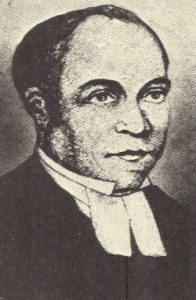
Described as a “genuine African,” Peter Williams and his parents were enslaved Africans. Williams’ enslaver, Mr. Aymar, was a tobacconist. He was also a Loyalist who left the country during the Revolutionary War. Having developed a skill, Williams went into business for himself as a tobacconist. He would eventually own a house, store, and other property–including himself. In 1783, Williams became the “property of the John Street Methodist church who bought him for forty (40) pounds.” From June 10, 1783, through October 20, 1796, Peter Williams worked off the debt and “refunded every pound the trustees had paid his master, and thus purchased himself.”
When Peter Williams led the African American members of the congregation from the church, he was leaving a church that compelled its African American members to wait to be served communion until all of the white members had been served. The realization that the church was not serving the needs of the African and African American community, and that African Americans could not be ordained as minister, were part of what motivated Williams to secede. Williams was the father of Peter Williams, Jr. (1780-1840), the first African American ordained minister in the Protestant Episcopal church. Peter Williams, Jr., became the first leader of St. Phillips African Church in 1819.
Black History, Education, Firsts, Religion
 There are 102 historically Black colleges and 253 Catholic colleges in the United States, yet only one is bothBlack and Catholic. That distinction belongs to Xavier University of Louisiana, which strives to combine the best attributes of both its faith and its culture.
There are 102 historically Black colleges and 253 Catholic colleges in the United States, yet only one is bothBlack and Catholic. That distinction belongs to Xavier University of Louisiana, which strives to combine the best attributes of both its faith and its culture.
Located in New Orleans, the small liberal arts college dates back to 1915, when St. Katharine Drexel and theSisters of the Blessed Sacrament founded the coeducational secondary school from which it evolved. (more…)
Black History, Religion
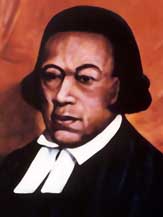
Absalom Jones
Founder of the African Episcopal Church of St. Thomas, Absalom Jones was born into slavery in Sussex County, Delaware, on November 6, 1746. He taught himself to read and knew the New Testament thoroughly at an early age. When he was 16, Absalom’s owner took him to Philadelphia, Pa., where he served as a clerk and handyman in a retail store.
He was allowed to work for himself in the evenings and keep his earning. He was married in 1770. By the time Jones was 38 years old, he had purchased his wife’s freedom, and his own, and had bought a house. Later he built two more houses and used them for rental income. (more…)
James Varick was born near Newburgh, New York, on January 10, 1750. His mother was a slave of the Varicks, or Van Varicks, and was later freed. His father, Richard, was born in Hackensack, New Jersey, where he was baptized in the Dutch Church. The family lived in New York City while James Varick was young, where he acquired an elementary education in New York schools. For many years, he worked as a shoemaker and later as a tobacco cutter to support himself and his family, because the church with which he was associated did not pay its preachers. About 1790, he married Aurelia Jones. The couple had four sons and three daughters. (more…)




